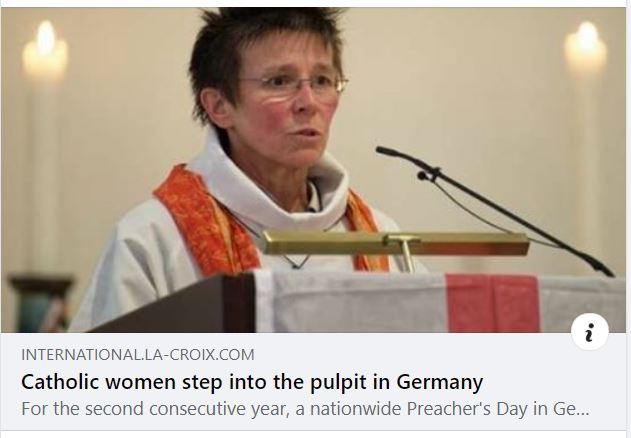
Marianne Arndt is pictured preaching the Mass at St. Elisabeth Church in Cologne, Germany. Parish assistant or not, this is a violation of liturgical law. Indeed, attiring her in an Alb with a scarf-like stole is an effort at dress-up that promotes the clericalization of women even though St. Pope John Paul II has solemnly defined women’s ordination as impossible. I would suggest an immediate and harsh censure upon the pastor and her termination as a staff person at the church. This is just another signpost of the German church heading off into schism.
We are told that she is one of twelve women who are a part of such orchestrated dissent. Advertised as “highly symbolic” events, they are in truth an effort to manipulate or force a feminist agenda upon the churches. The dissent reaches to the very top of the Catholic Women’s Association in Germany with its president, Ulrike Göken-Huismann preaching at St. Maximilian Church in Düsseldorf, Germany.
Does anyone deny that some women can preach well? No. Do we need to do a better job as a Church in sharing or utilizing the faith and gifts of women? Yes, I would say this is assuredly so. However, I would contend that such women theologians must think and practice in harmony with Church belief and laws and not with a tension that smacks of rebellion. I cannot imagine anyone who would oppose the late Mother Teresa speaking at Mass, if such were allowed. However, those most vocal tend to be those who spurn lawful authority and Church tradition. They will not seek to be given this privilege; rather they would rather take it away from the hands of the Church and her anointed shepherds.
Notice the theological heresy in the article from the Catholic Women’s Association that not all the apostles were men. These dissenters, women and married, have their sights on holy orders. It is not about sharing reflections at church. As for St. Junia whom they cite, a number of scholars contend that the reference to being a woman apostle is a mistranslation and should be rendered as “well known to the apostles.” Notice that the critic has to point to a questionable rendering of a saint in the Orthodox Church that does not itself accept the notion of women priests or bishops. Indeed, later authorities insist that the figure is actually a man. Dissenters often grasp at dubious straws to make their case against long-standing belief and traditions.
Göken-Huismann says that she is sure that “Rome cannot oppose” women preaching at Mass. However, I would contend that while Rome could allow women to speak, she and the other dissenters should be permanently banned from both preaching and teaching in the Church. She goes on to say that she is convinced that women will one day become priests. No, not unless Jesus comes through the clouds and gives a new universal revelation, such will never happen. The churches that have sought to ordain women as priests and bishops have definitively forfeited holy orders and the real presence and activity of Christ in the Eucharist. Such, as the late St. Pope John Paul II taught, is too terrible a prospect to take seriously. She speaks of the priesthood as a matter that they have “a right to do.” No, holy orders is directed toward service but first requires a transformation of identity as “another Christ” and as the “bridegroom to the Church.” The priest is a man so that he will be a proper icon for Christ. No one has a right to the priesthood. It is a gift given to certain men for the good of the Church. The exclusion of women from the priesthood is no more a matter about equal rights than the fact that only men can be biological fathers and only women can be biological mothers. It is what it is. Wishing it were otherwise has no bearing whatsoever. Much is made that a majority of people support these protest movements. That has yet to be proven but the Church and the deposit of faith are not open to democratic renunciation or revision. Our posture must not be belligerence but rather humility and acceptance.
I am reminded of my early days in seminary. We had a program at weekday liturgies where the students studying for priesthood could offer short reflections at the end of Mass. However, we were admonished by the bishop to cease the effort. We had thought we had gotten around the preaching prohibition by placing the remarks at the end of the liturgy. We were wrong.
Filed under: Uncategorized | Leave a comment »














































